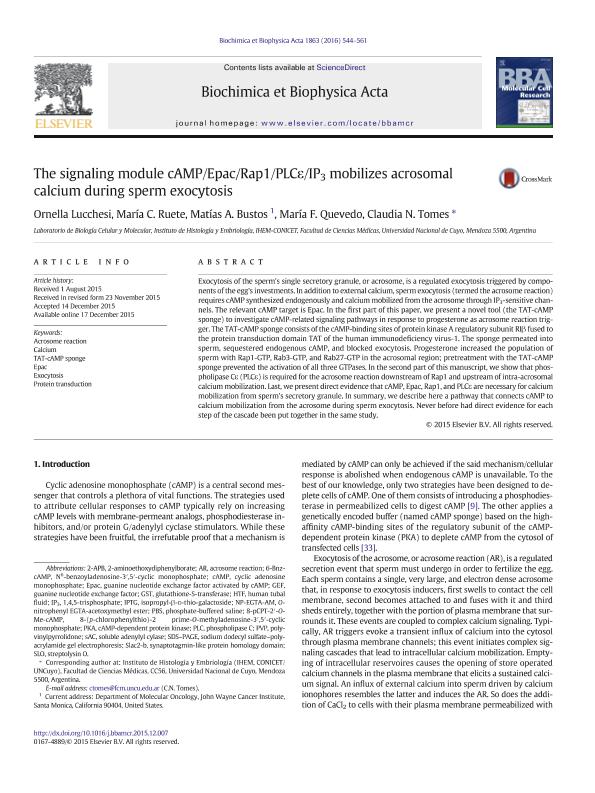Artículo
The signaling module cAMP/Epac/Rap1/PLCε/IP3 mobilizes acrosomal calcium during sperm exocytosis
Lucchesi, Ornella ; Ruete, María Celeste
; Ruete, María Celeste ; Bustos, Matias Alberto
; Bustos, Matias Alberto ; Quevedo, María Florencia
; Quevedo, María Florencia ; Tomes, Claudia Nora
; Tomes, Claudia Nora
 ; Ruete, María Celeste
; Ruete, María Celeste ; Bustos, Matias Alberto
; Bustos, Matias Alberto ; Quevedo, María Florencia
; Quevedo, María Florencia ; Tomes, Claudia Nora
; Tomes, Claudia Nora
Fecha de publicación:
04/2016
Editorial:
Elsevier Science
Revista:
Biochimica et Biophysica Acta-Molecular Cell Research
ISSN:
0167-4889
Idioma:
Inglés
Tipo de recurso:
Artículo publicado
Clasificación temática:
Resumen
Exocytosis of the sperm's single secretory granule, or acrosome, is a regulated exocytosis triggered by components of the egg's investments. In addition to external calcium, sperm exocytosis (termed the acrosome reaction) requires cAMP synthesized endogenously and calcium mobilized from the acrosome through IP3-sensitive channels. The relevant cAMP target is Epac. In the first part of this paper, we present a novel tool (the TAT-cAMP sponge) to investigate cAMP-related signaling pathways in response to progesterone as acrosome reaction trigger. The TAT-cAMP sponge consists of the cAMP-binding sites of protein kinase A regulatory subunit RIβ fused to the protein transduction domain TAT of the human immunodeficiency virus-1. The sponge permeated into sperm, sequestered endogenous cAMP, and blocked exocytosis. Progesterone increased the population of sperm with Rap1-GTP, Rab3-GTP, and Rab27-GTP in the acrosomal region; pretreatment with the TAT-cAMP sponge prevented the activation of all three GTPases. In the second part of this manuscript, we show that phospholipase Cε (PLCε) is required for the acrosome reaction downstream of Rap1 and upstream of intra-acrosomal calcium mobilization. Last, we present direct evidence that cAMP, Epac, Rap1, and PLCε are necessary for calcium mobilization from sperm's secretory granule. In summary, we describe here a pathway that connects cAMP to calcium mobilization from the acrosome during sperm exocytosis. Never before had direct evidence for each step of the cascade been put together in the same study.
Palabras clave:
Acrosome Reaction
,
Calcium
,
Epac
,
Exocytosis
,
Protein Transduction
,
Tat-Camp Sponge
Archivos asociados
Licencia
Identificadores
Colecciones
Articulos(IHEM)
Articulos de INST. HISTOLOGIA Y EMBRIOLOGIA DE MEND DR.M.BURGOS
Articulos de INST. HISTOLOGIA Y EMBRIOLOGIA DE MEND DR.M.BURGOS
Citación
Lucchesi, Ornella; Ruete, María Celeste; Bustos, Matias Alberto; Quevedo, María Florencia; Tomes, Claudia Nora; The signaling module cAMP/Epac/Rap1/PLCε/IP3 mobilizes acrosomal calcium during sperm exocytosis; Elsevier Science; Biochimica et Biophysica Acta-Molecular Cell Research; 1863; 4; 4-2016; 544-561
Compartir
Altmétricas



